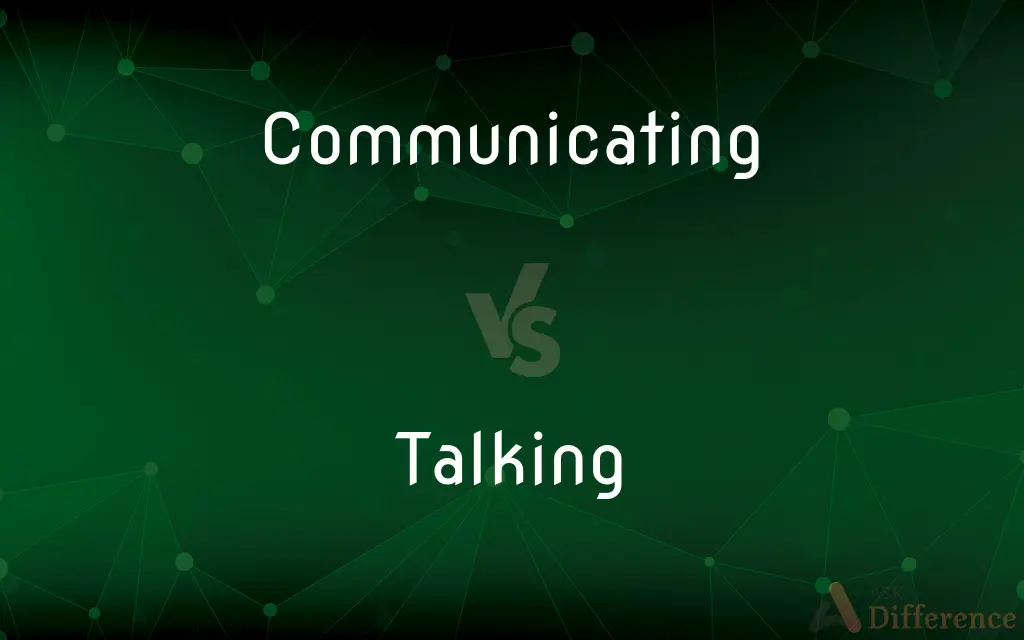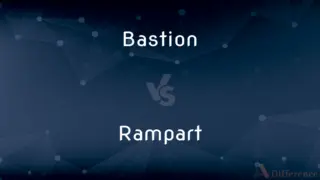Communicating vs. Talking — What's the Difference?
Edited by Tayyaba Rehman — By Maham Liaqat — Updated on April 22, 2024
"Communicating" encompasses all forms of conveying information, including non-verbal cues, whereas "talking" specifically refers to verbal speech between people.

Difference Between Communicating and Talking
Table of Contents
ADVERTISEMENT
Key Differences
"Communicating" involves the transmission of ideas, emotions, or information through various means, including gestures, writing, and digital media, aiming for clarity and understanding. On the other hand, "talking" is limited to verbal exchange using spoken words and is often casual or informal.
Effective communication requires consideration of the receiver's perspective and feedback, ensuring the message is understood as intended. Whereas talking might not necessarily aim for feedback or understanding, sometimes serving merely to express thoughts or feelings.
Communicating can occur in multiple formats — verbal, non-verbal, written, or visual — adapting to the needs of the situation and audience. In contrast, talking is inherently auditory and requires the physical presence or technological means (like a phone) to facilitate voice transmission.
In professional or technical settings, communicating is strategic, often involving careful planning and the use of specific tools or protocols to enhance understanding. Talking, however, can be spontaneous and requires less structured preparation.
The goal of communicating is often to persuade, inform, or solve conflicts, making it fundamental in both personal and professional interactions. Talking, while it can achieve these ends, typically focuses more on the act of speech rather than the outcome of the exchange.
ADVERTISEMENT
Comparison Chart
Definition
The act of conveying information effectively
The act of speaking verbally
Forms
Verbal, non-verbal, written, visual
Primarily verbal
Purpose
To inform, persuade, or solve conflicts
To express thoughts or engage in dialogue
Feedback Required
Often involves feedback for clarity
May not necessarily seek feedback
Settings
Can be formal or informal, varies by context
Usually informal, casual
Compare with Definitions
Communicating
The exchange of thoughts, messages, or information, as by speech, signals, writing, or behavior.
Their communicating skills improved after attending the workshop.
Talking
The vocal expression of ideas or narratives.
He enjoys talking about history to anyone who will listen.
Communicating
Using tools or technology to convey messages.
Communicating through social media platforms has become ubiquitous.
Talking
Engaging in speech for the purpose of social interaction.
They were talking all night about their childhood memories.
Communicating
The transmission of signals or messages over a distance for the purpose of connection.
He was communicating his ideas through a series of emails.
Talking
The act of verbal communication specifically using spoken words.
Talking quickly became difficult in the noisy environment.
Communicating
Non-verbal interaction that conveys emotions or intentions.
His subtle communicating through gestures helped avoid a verbal conflict.
Talking
Casual exchange of words between individuals.
The two strangers started talking at the bus stop.
Communicating
The process of sharing information through various means to ensure mutual understanding.
Effective communicating often requires careful choice of words and mediums.
Talking
Verbal articulation in various contexts.
Talking during the movie is generally frowned upon.
Communicating
To convey information about; make known; impart
Communicated his views to our office.
Talking
To exchange thoughts or opinions in spoken or sign language; converse
We talked for hours.
Communicating
To reveal clearly; manifest
Her disapproval communicated itself in her frown.
Talking
To utter or pronounce words
The baby can talk.
Communicating
To spread (a disease, for example) to others; transmit
A carrier who communicated typhus.
Talking
To imitate the sounds of human speech
The parrot talks.
Communicating
To have an interchange, as of ideas.
Talking
To express one's thoughts or emotions by means of spoken language
The candidate talked about the pros and cons of the issue.
Communicating
To express oneself in such a way that one is readily and clearly understood
"That ability to communicate was strange in a man given to long, awkward silences" (Anthony Lewis).
Talking
To convey one's thoughts in a way other than by spoken words
Talk with one's hands.
Communicating
(Ecclesiastical) To receive Communion.
Talking
To express one's thoughts or feelings in writing
Voltaire talks about London in this book.
Communicating
To be connected, one with another
Apartments that communicate.
Talking
To convey information in text
The article talks about the latest fashions.
Communicating
Present participle of communicate
Talking
To negotiate with someone; parley
Let's talk instead of fighting.
Communicating
Allowing people to pass directly between two rooms.
Our rooms are connected by a secret communicating passage.
Talking
To consult or confer with someone
I talked with the doctor.
Communicating
The activity of communicating.
Talking
To spread rumors; gossip
If you do that, people will talk.
Communicating
The activity of communicating; the activity of conveying information;
They could not act without official communication from Moscow
Talking
To allude to something
Are you talking about last week?.
Talking
To reveal information concerning oneself or others, especially under pressure
Has the prisoner talked?.
Talking
(Informal) To be efficacious
Money talks.
Talking
To utter or pronounce (words)
Their son is talking sentences now.
Talking
To speak about or discuss (something) or give expression to (something)
Talk business.
Talk treason.
Talking
Used to emphasize the extent or seriousness of something being mentioned
The police found money in the car. We're talking significant amounts of money.
Talking
To speak or know how to speak (a language or a language variety)
The passenger talked French with the flight crew. Can you talk the local dialect?.
Talking
To cause (someone) to be in a certain state or to do something by talking
They talked me into coming.
Talking
An exchange of ideas or opinions; a conversation
We had a nice talk over lunch.
Talking
A speech or lecture
He gave a talk on art.
Talking
Hearsay, rumor, or speculation
There is talk of bankruptcy.
Talking
A subject of conversation
A musical that is the talk of the town.
Talking
Often talks A conference or negotiation
Peace talks.
Talking
A particular manner of speech
Baby talk.
Honeyed talk.
Talking
Empty speech or unnecessary discussion
A lot of talk and no action.
Talking
Jargon or slang
Prison talk.
Talking
Something, such as the sounds of animals, felt to resemble human talk
Whale talk.
Talking
The action of the verb talk.
Talking
Present participle of talk
Talking
That talks; able to utter words; as, a talking parrot.
Talking
Given to talk; loquacious.
The hawthorn bush, with seats beneath the shade,For talking age and whispering lovers made.
Talking
An exchange of ideas via conversation;
Let's have more work and less talk around here
Talking
Uttering speech;
Talking heads
Common Curiosities
How does non-verbal communication differ from talking?
Non-verbal communication involves conveying messages without words, using body language, facial expressions, and other visual cues, unlike talking, which uses words.
What is the main difference between communicating and talking?
Communicating is a broad term that encompasses all forms of conveying information, while talking specifically refers to verbal communication.
What skills are essential for effective communicating?
Listening, empathy, clarity in message delivery, and the ability to adapt to various forms of communication are crucial for effective communicating.
How can someone improve their communicating skills?
Improving listening skills, practicing clear and concise message delivery, and learning to read non-verbal cues can enhance communication skills.
Can animals communicate without talking?
Yes, animals communicate through various means such as sounds, physical behaviors, and chemical signals, which do not involve talking.
What role does technology play in modern communication?
Technology facilitates diverse communication forms, including digital communication, enhancing the speed and reach of messages globally.
Can you communicate without talking?
Yes, communication can be non-verbal, such as through gestures, facial expressions, or written texts.
Why is communicating considered more comprehensive than talking?
Communicating covers various forms and contexts, aiming for clear understanding, while talking is limited to speech and may not aim for thorough understanding.
Does talking always mean effective communication?
No, talking is just one aspect of communication and does not guarantee that the intended message is effectively understood.
What is the impact of poor communication in the workplace?
Poor communication can lead to misunderstandings, decreased productivity, and conflicts in professional settings.
Share Your Discovery

Previous Comparison
Bastion vs. Rampart
Next Comparison
Review vs. ConfirmAuthor Spotlight
Written by
Maham LiaqatEdited by
Tayyaba RehmanTayyaba Rehman is a distinguished writer, currently serving as a primary contributor to askdifference.com. As a researcher in semantics and etymology, Tayyaba's passion for the complexity of languages and their distinctions has found a perfect home on the platform. Tayyaba delves into the intricacies of language, distinguishing between commonly confused words and phrases, thereby providing clarity for readers worldwide.
















































